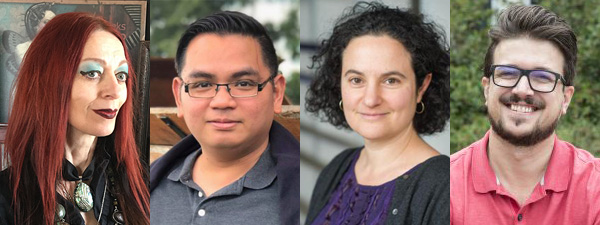
Nicola Levell (Anthropology)
“Dark Skies: Celestial Bodies, Art & Sounds—a Digital Exhibit”
Based on collaboration with different knowledge-holders, including Indigenous storytellers, artists and astrophysicists, this research project sets out to co-create and launch a dynamic digital exhibit that will explore celestial heritage and the night sky from different cultures and traditions. Interdisciplinary and inclusive in scope, the digital exhibit will include audiovisual content, artworks, storytelling, constellation maps, Hubble images and the sound of stars. It will expand and remediate the contents of a physical exhibition that I am co-curating with Dr. April Liu, which debuts in October 2020 at the Haida Gwaii Museum.
This digital-exhibit project seeks not only to diversify public understanding of the night sky but to promote recognition and respect for Indigenous ways of knowing and raise awareness of the devastating effects of light pollution on earth’s fragile ecologies. With over 80% of the world’s population living under light-polluted skies, the ability to see celestial bodies, with the human-eye or telescope, is being radically diminished. Unsettling the art-science divide, this innovative public-facing research project aims to mobilize celestial knowledge, integrating multiple perspectives, voices and media, to encourage public engagement and foster strategies for preserving dark skies as part of the common heritage of humanity.
John Paul Catungal (Institute for Gender, Race, Sexuality & Social Justice)
“Mentorship as Political Practice: Filipino-Canadians Organizing Against Educational Abandonment in Vancouver BC”
“Mentorship as political practice” is a community based research partnership (CBRP) that uses oral and organizational histories to document efforts by Filipino Canadian communities to deal with disproportionally high rates of educational incompletion among Filipino Canadian youth in Vancouver. Bridging scholarship in Filipino Canadian studies with bottom-up efforts to respond to “educational abandonment”, this project places educational experiences and outcomes within the context of broader systemic issues that shape Filipino Canadian lives, including intergenerational traumas resulting from protracted family separation, racialized labour markets that channel Filipino-Canadians into low-wage jobs, and the stereotyping of Filipino-Canadians by educators, policymakers and the media as unruly troublemakers. Working in partnership with Kababayan Academic Mentorship Program (KAMP), we have compiled an archive of oral histories from KAMP leaders, alumni mentors and mentees, which comprise lived and embodied knowledges of educational abandonment as well as of “for us, by us” efforts to respond in culturally grounded ways. This proposal seeks support for various public facing aspects of this research: the continuation of our CBRP, the writing of a community report and media releases reporting on results, and a community “report back” event that will use creative storytelling and performances (spoken word, music, visual arts) as a means to proliferate public knowledge about Filipino Canadian experiences and agency.
Leslie Paris (History)
“‘Send it to ZOOM!’: A Fiftieth Anniversary Retrospective”
January 2022 will mark the fiftieth anniversary of the first weekly episode of ZOOM, one of the best-loved American children’s television programs of the 1970s. I propose to do oral history interviews of participants in the series, and to create a public-facing online exhibit for americanarchive.org using these interviews as well as archival materials from host station WGBH. I would also promote this project in print media, and at UBC through a public lecture. My project will produce new knowledge about 1970s American childhood, the experience of child celebrity, children’s networks in an era of snail mail and SASEs, and ZOOM nostalgia. Using the expertise of former participants, as well as material from the archive, I will extend the circle of knowledge about ZOOM and its place in the shifting landscape of children’s media culture.
David Gaertner (Institute for Critical Indigenous Studies)
“Centre for Community-Engaged Documentation and Research”
As stakeholders across the country work together to maintain, revitalize and reclaim language and culture, we must leverage emergent technologies to meet the need for effective tools to support intergenerational transmission. With the support of the Canadian Foundation for Innovation (CFI) and the Dean of Arts office, infrastructure within the Community Engaged Documentation and Research space (CEDaR) will develop cutting-edge digital technologies, partnerships, and expertise to bridge the gap between community needs and university output. CEDaR will provide researchers, and the communities with whom we are partnered, with the essential infrastructure to develop and advance interwoven approaches to the digital documentation of community-held knowledge, the effective mobilization of this documentation using new media, and, uniquely, the community-guided and user-centred stewardship of such knowledge. The support request from the PHH will provide Dr. Gaertner with the opportunity to research and develop CEDaR’s online portal: the public-facing website for the initiative, which serve both as a knowledge dissemination tool and as a hub for the development of community-led digital initiatives.